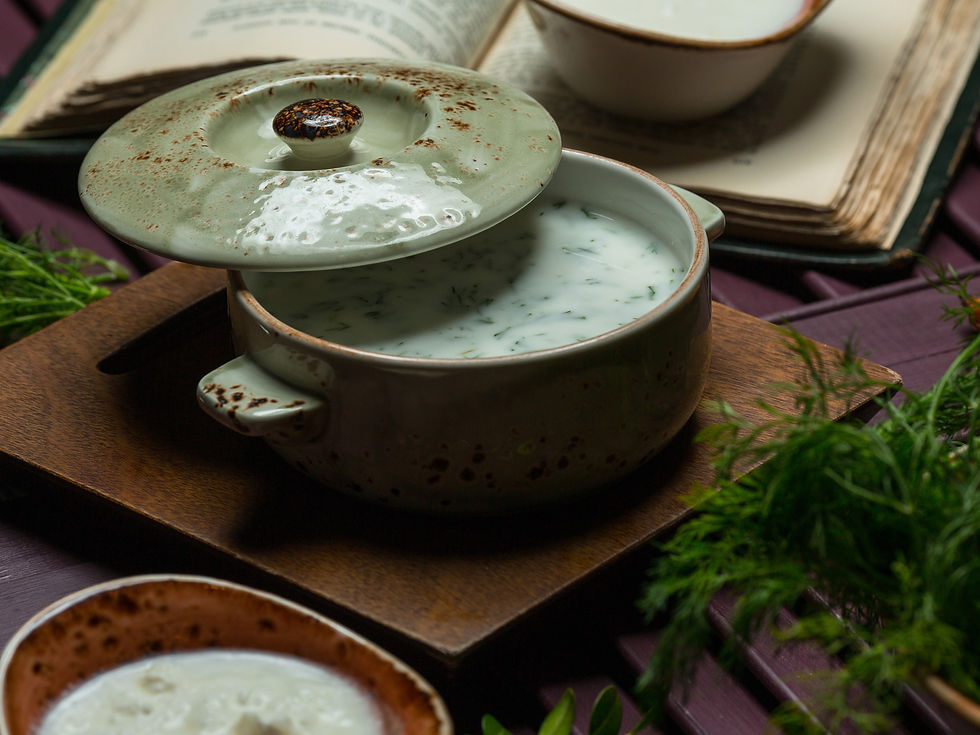Fennel and Chamomile Digestion: Herb Profiles for Gut Health
- Kellen Day
- May 29
- 3 min read
Updated: Jun 22

Herbal remedies have been cherished for centuries, offering gentle, natural support for our digestive systems. In this guide, we’ll explore two powerhouse herbs—fennel and chamomile—to understand their digestive benefits, their historical uses, and how you can incorporate them into your routine or soup cleansing practice.
Fennel and Chamomile Digestion
Fennel: The Soothing Seed
Historical Use
Fennel (Foeniculum vulgare) has been used since Roman times to flavor foods and aid digestion. In Ayurvedic and Traditional Chinese Medicine, fennel seeds were chewed after meals to freshen breath and ease digestive discomfort.
Active Compounds & Gut-Science
Fennel’s therapeutic properties are attributed to its volatile oils, particularly anethole, which exhibits antispasmodic effects. Studies have shown that anethole helps relax intestinal smooth muscle, thereby reducing cramps, bloating, and gas in the digestive tract.
Additionally, fennel seeds contain fiber and antioxidants that protect the gut lining from oxidative stress, promoting a balanced microbiome and smoother digestion. By stimulating digestive juice secretion, fennel can also improve nutrient absorption and support regular bowel movements.
How to Use Fennel for Digestion
Fennel Tea: Steep 1 teaspoon of crushed seeds in hot water for 10 minutes. Sip after meals.
Soup Cleansing Addition: Add a few fennel seeds to your broth during a soup cleanse to enhance antispasmodic effects and flavor.
Digestive Tonic: Chew a teaspoon of seeds slowly, or use fennel seed extract capsules as directed on the product label.
Chamomile: The Calming Flower
Historical Use
Chamomile (Matricaria chamomilla) has been brewed as an herbal infusion since ancient Egypt and Europe, where it was valued for its calming, anti-inflammatory effects on both mind and body.
Active Compounds & Gut-Science
Chamomile’s key constituents include flavonoids, such as apigenin, and volatile oils, including alpha-bisabolol. Apigenin exhibits anti-inflammatory activity by modulating signaling pathways linked to gut inflammation. Animal studies suggest chamomile may help control diarrhea and protect against stomach ulcers.
Moreover, chamomile acts as a mild antispasmodic, relaxing stomach muscles and soothing abdominal pain, making it especially helpful for those experiencing menstrual cramps and general digestive discomfort (evinature.com).
How to Use Chamomile for Digestion
Chamomile Tea: Steep 1–2 teaspoons of dried flowers in hot water for 5–8 minutes. Drink before bed or after meals.
Herbal Broth: Infuse chamomile, ginger, and lemon balm in a light vegetable broth during your soup cleanse to combine anti-inflammatory benefits with calming warmth.
Tincture or Capsule: Follow the manufacturer’s directions for dosage to support regular digestion and stress reduction.
Combining Fennel & Chamomile
Pairing these herbs can create a synergistic digestive aid:
Evening Digestive Tea: Combine equal parts of fennel seeds and chamomile flowers. Sip slowly as above to wind down and support overnight gut repair.
Digestive Soup Blend: Add crushed fennel seeds and chamomile flowers to a clear broth, along with soothing herbs like ginger and mint, for a gentle soup cleanse blend that promotes hydration and gut rest.
Tips for Safe Use
Start with low doses to assess tolerance.
Consult your healthcare provider if you are pregnant, nursing, or on medications.
Ensure herbs are sourced from reputable, organic suppliers to minimize the risk of contaminants.
Conclusion
Fennel and chamomile offer time-tested, gut-science–backed support for digestion, from easing cramps and bloating to reducing inflammation and protecting the gut lining. Whether enjoyed as teas, tinctures, or incorporated into a soup cleansing routine, these herbs provide natural pathways to digestive comfort and well-being. Experiment mindfully with both to discover the blend that best renews your gut health.










Comments